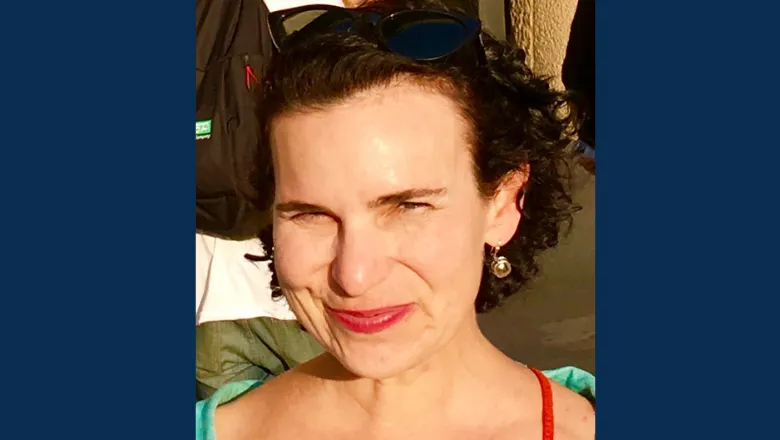13 March 2019
5 Minutes with…Professor Jody Rosenblatt
Jody Rosenblatt is a Professor of Cell Biology who recently joined the Randall Centre for Cell & Molecular Biophysics from the University of Utah. The Rosenblatt group study mechanical forces that control epithelial cell turnover. Here, we speak to Jody about her career to date, who inspires her and what advice she would give to her 18 year-old self

Briefly, tell me about your background and career up to this point at King’s?
I have spent the last 13 years running my lab at the Huntsman Cancer Institute at the University of Utah in Salt Lake City. There, I learned a lot about cancer—, especially from clinicians and patients. This was a real eye-opener for our own science, which focuses on how epithelial cells turnover normally since it goes awry in cancer. Learning about cancer taught us what goes wrong the most in these pathways. Before going to Utah to start my lab, I did my postdoc fairly independently at the MRC-LMCB at University College London, where I discovered a new mechanism that causes most epithelial cell death—extrusion. Over time, we realized that the reason that cells die from extrusion is that they physically become too crowded. This has made our work shift more into mechanobiology. As I’ve aged, I’ve felt the biological directive to also become crowded and decided to move back to London. I’ve really missed life here and have been incredibly excited about all the work going on in biophysics, cell biology, cancer, and asthma—which is a new direction for us. I’m arriving with most of my lab from Utah in the next few months and we are all really excited about moving here!
What research are you currently working on?
We study mechanical forces that control epithelial cell turnover. When cells are too sparse, the stretch activates some cells to divide and when they are too crowded, some cells get extruded out of the layer to die. From these discoveries, we have now found that diseases can result when the forces or signals downstream of them go awry. When cells experience too much crowding during a bronchoconstrictive asthma attack, too many cells extrude, which destroys the barrier and causes the resulting inflammatory period. When cells are blocked from cell extrusion, they either pile up into masses or extrude aberrantly into the tissue the epithelia encase. This ‘intrusion’ is a way that tumour cells invade the underlying stroma and simultaneously shed their epithelial determinants. We can see this all live in the transparent zebrafish.
What is a typical day like for you?
I love walking to work—that starts the day on the right foot. I have become quite familiar with touch-typing. But for me, a good day is when I can get on a microscope and see experiments! I am much more excited by visual stimulus than reading.
Where is your research area heading in the next 5 years?
Our work on epithelia has taught us how important physical forces are too controlling whether epithelia divide or extrude. Ultimately, this comes down to what the underlying tissue or ‘stroma’ is doing. An important contractile component of this stroma is smooth muscle, which has become understudied over the last 50 years or so. We are very interested in understanding how the epithelia interact with smooth muscle during normal physiology and how this becomes hyperactive in diseases like asthma and potentially other cramping-associated inflammatory diseases.
What would you like members of our school to most know about you and your research area?
While we mainly work on how epithelial cells turnover, our findings that biomechanics play a major role in cell turnover has led us to focus more on smooth muscle. We are really excited to learn from the labs here about muscle biology, biophysics, imaging, and asthma.
What is your favourite part of your current role?
Learning about the research going on around us! I’m happy to spend less time doing administrative tasks and more time doing research and learning!
What do you do with your time outside of academia?
I love going to museums, small concerts, and movies and visiting with friends. Really looking forward to getting to spend time with all my old pals from my post-doc years here!
What advice would you give to your 18-year-old self?
Don’t be too stressed about what you are doing. Be adaptable and scrappy. We have learned much more by the experiments that didn’t go right and had a fun life by taking risks and not forcing things that weren’t working. The more I used to get bent on getting something done a certain way, the less well things went. The more I have learned to listen to the results and the experiment and go with the flow, the more interesting the research has become.
Who do you look up to (inside or outside of academia)?
In academia, I have really liked the leadership styles of Bruce Albert, Alan Hall, and Mary Beckerle, as they have taken a keen interest in people and were willing to be tough when need be. As scientists, I really like people who do more old-school science with a focus on observing new things like Matthieu Piel, Michael Overholtzer, Danijela Vignjevic, and Elizabeth Hillman
Any leaving remarks that you would like other members of our school to know about you?
Yes, I know you are having a Brexit situation, but we are having a Trump situation. When times are bad, we need to cultivate our own gardens.
QUICK-FIRE:
Favourite Movie: A Room with a View
Favourite Book: Candide
Favourite TV Show: Silicon Valley and Freaks and Geeks
Favourite Scientist: Albert Szent-Györgyi and Marie Curie
